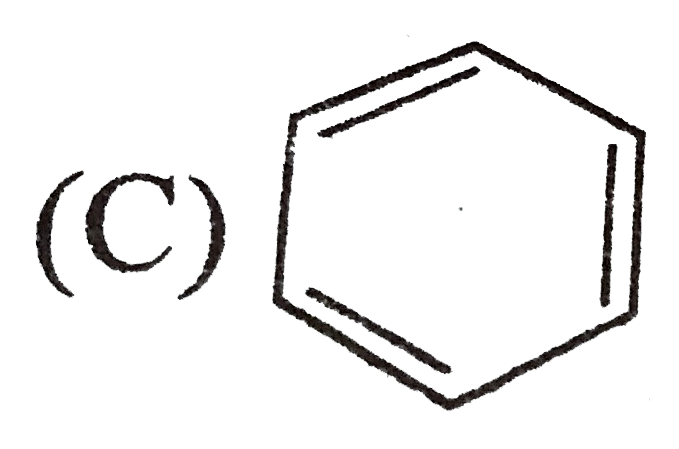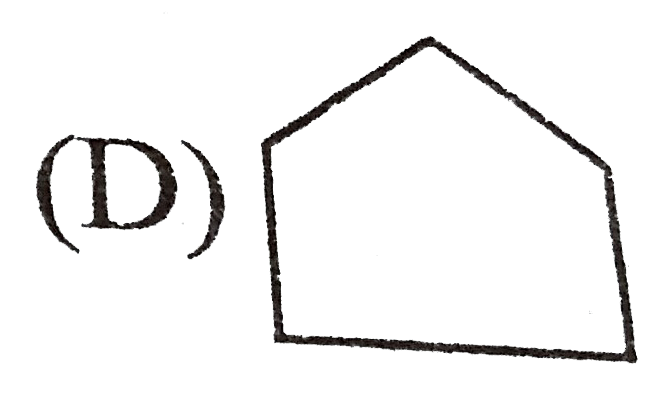Which of the following decolourises bromine water as well as Baeyer's reagent?
Propane
Cyclopropane
Propyne
Benzene
The correct Answer is:C
To determine which of the following compounds decolorizes bromine water as well as Baeyer's reagent, we need to analyze the behavior of each compound with these reagents. The compounds in question are propane, cyclopropane, propine, and benzene.
1. Understanding Bromine Water and Baeyer's Reagent:
- Bromine water (Br2 in H2O) is used to test for unsaturation (double or triple bonds) in organic compounds. Unsaturated compounds will decolorize bromine water.
- Baeyer's reagent (cold, dilute alkaline KMnO4) is also used to test for unsaturation. It is purple in color and will decolorize in the presence of alkenes and alkynes.
2. Analyzing Each Compound:
- Propane (C3H8): This is a saturated hydrocarbon (alkane) with no double or triple bonds. It will not decolorize bromine water or Baeyer's reagent.
- Cyclopropane (C3H6): This is also a saturated compound (though it has a ring structure) and does not have any double or triple bonds. It will not decolorize either reagent.
- Propine (C3H4): This is an unsaturated hydrocarbon (alkyne) with a triple bond. It can react with bromine water and Baeyer's reagent, leading to decolorization.
- Reaction with bromine water: Propine reacts with Br2 to form Bromoacetone, which is colorless, thus decolorizing the bromine water.
- Reaction with Baeyer's reagent: Propine reacts with alkaline KMnO4, resulting in the formation of pyruvic acid (2-oxopropanoic acid), which also leads to the decolorization of the purple KMnO4 solution.
- Benzene (C6H6): This is an aromatic compound and does not react with bromine water or Baeyer's reagent under normal conditions, thus it will not cause decolorization.
3. Conclusion:
- Among the given options, only propine decolorizes both bromine water and Baeyer's reagent.
Final Answer:
The correct answer is propine (option no. 3).
---
- Bromine water (Br2 in H2O) is used to test for unsaturation (double or triple bonds) in organic compounds. Unsaturated compounds will decolorize bromine water.
- Baeyer's reagent (cold, dilute alkaline KMnO4) is also used to test for unsaturation. It is purple in color and will decolorize in the presence of alkenes and alkynes.
- Propane (C3H8): This is a saturated hydrocarbon (alkane) with no double or triple bonds. It will not decolorize bromine water or Baeyer's reagent.
- Cyclopropane (C3H6): This is also a saturated compound (though it has a ring structure) and does not have any double or triple bonds. It will not decolorize either reagent.
- Propine (C3H4): This is an unsaturated hydrocarbon (alkyne) with a triple bond. It can react with bromine water and Baeyer's reagent, leading to decolorization.
- Reaction with bromine water: Propine reacts with Br2 to form Bromoacetone, which is colorless, thus decolorizing the bromine water.
- Reaction with Baeyer's reagent: Propine reacts with alkaline KMnO4, resulting in the formation of pyruvic acid (2-oxopropanoic acid), which also leads to the decolorization of the purple KMnO4 solution.
- Benzene (C6H6): This is an aromatic compound and does not react with bromine water or Baeyer's reagent under normal conditions, thus it will not cause decolorization.
- Among the given options, only propine decolorizes both bromine water and Baeyer's reagent.
The correct answer is propine (option no. 3).
Topper's Solved these Questions
Similar Questions
Knowledge Check
Which of the following decolourise bromien water as welll as Baeyer's reagent?
APropaneBCyclopropaneCPropyneDBenzeneWhich of the following will decolourise bromine water
ACH2=CH2BCH≡CHC D
D
Baeyer's reagent is
AAlkaline KMnO4BAmmonical AgNO3CAmmonical CuSO4DCaSO4/Ca(OH)2
